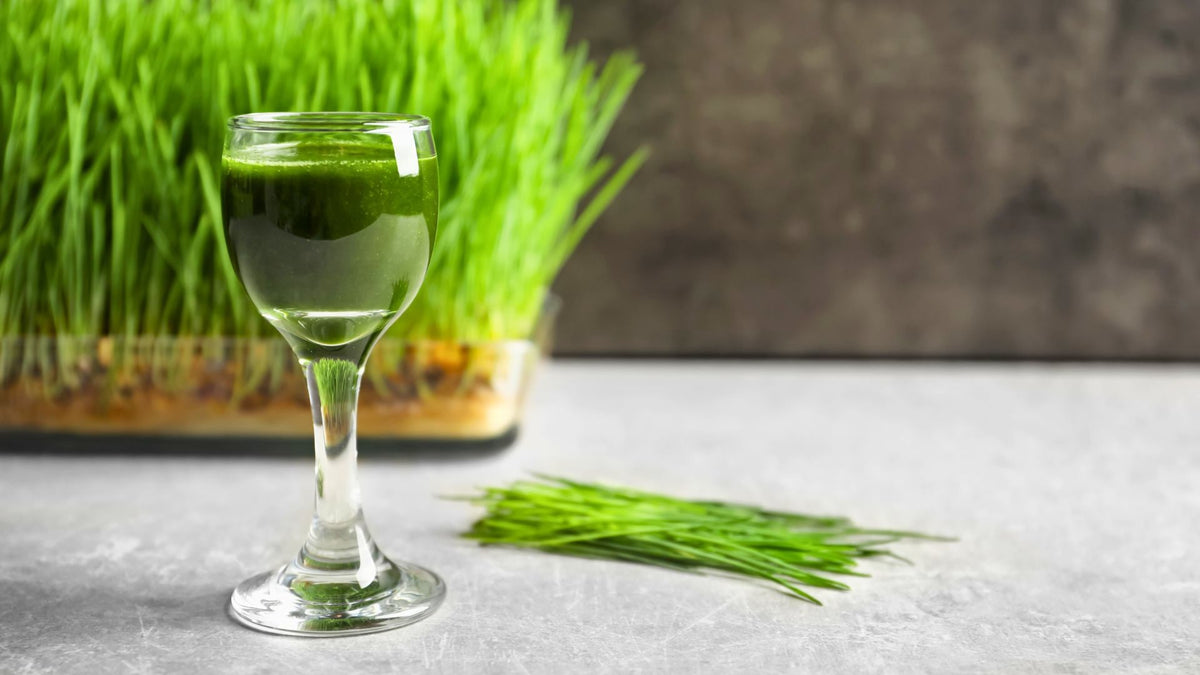
Does Wheatgrass Juice Have Gluten?
|
|
Time to read 4 min
This store requires javascript to be enabled for some features to work correctly.
|
|
Time to read 4 min
Table of Content
Disclaimer: The information provided in this article is for educational purposes only and is not intended as a substitute for professional medical advice, diagnosis, or treatment. Always seek the advice of your physician or other qualified healthcare provider with any questions you may have regarding a medical condition or before making any changes to your diet or lifestyle, especially if you have existing health conditions.
Wheatgrass juice is an excellent health supplement due to its very dense nutritional profile and several well studied health benefits . However, for individuals with gluten sensitivity or celiac disease, there's a pressing need to confirm whether wheatgrass juice is truly gluten-free.
This article delves into the specifics of wheatgrass, and answers the question: does wheatgrass juice contain gluten? I look at 2 scientific studies plus recommendations from beyondceliac.org.
Gluten is a protein found in wheat and related grains like barley and rye. It gives dough its elasticity and helps it rise and maintain shape. While gluten is harmless for most people, it can cause serious health issues for others.
For individuals with celiac disease, an autoimmune disorder, ingesting gluten triggers an immune response that damages the small intestine, leading to malabsorption of nutrients. Non-celiac gluten sensitivity and wheat allergy are other conditions where gluten intake causes adverse health effects, including digestive discomfort, headaches, and fatigue. Thus, identifying gluten-free foods is crucial for those affected.
Wheatgrass itself does not contain gluten. Wheatgrass juice is derived from the young shoots of the wheat plant, specifically harvested before the wheat seeds form. Since gluten is primarily found in the seeds, this makes wheatgrass juice inherently gluten-free.
However, caution is advised due to potential cross-contamination during cultivation or processing. For individuals with celiac disease or gluten sensitivity, it's essential to ensure that the wheatgrass juice consumed is certified gluten-free to avoid any adverse reactions.
Confirmation of gluten-free status of wheatgrass (Triticum aestivum):
Summary: This study confirms that wheatgrass is gluten-free when prepared appropriately. Using R5 and G12 ELISA tests, they examined commercial and home-grown wheatgrass, finding its gluten content below detectable levels. The study suggests that wheatgrass could be beneficial for those on gluten-free diets, like individuals with celiac disease, due to its nutritional properties and the absence of gluten.
Authors: S.L. Adrianos and M. Tilley are affiliated with the USDA-ARS, Center for Grain and Animal Health Research in Manhattan, KS, USA. B. Mattioni is from the Laboratory of Cereals, Food Science and Technology Department at the Federal University of Santa Catarina, Florianópolis, SC, Brazil.
Nutritional and physiochemical properties of wheatgrass juice and preservation strategies:
Summary: The study confirms that wheatgrass juice is gluten-free, thus suitable for those with gluten intolerance. It also discusses various non-thermal pasteurization methods to preserve the nutritional quality of wheatgrass juice while extending its shelf life.
Authors: Francisco Cores Rodríguez, Eimear Gallagher, Dilip K. Rai, Catherine M. Burgess.
Summary: Wheatgrass is gluten-free when it is harvested before the wheat plant begins to form seeds. The gluten in wheat is primarily found in the seeds, not the grass itself. However, there's a risk of cross-contamination during cultivation, so it's recommended that individuals with celiac disease or gluten sensitivity should opt for products that are certified gluten-free and be cautious about the source of wheatgrass.
Wheatgrass juice is considered gluten-free because it is made from the young shoots of the wheat plant, harvested before the wheat seeds form. Gluten is primarily found in the seeds of the wheat plant, not in the grass itself. As long as the wheatgrass is harvested and processed correctly, without contamination from gluten-containing grains, the resulting juice remains free of gluten.
Yes, people with celiac disease can safely consume wheatgrass juice, as it is naturally gluten-free. However, they must ensure that the wheatgrass juice is certified gluten-free to avoid the risk of cross-contamination during cultivation or processing. It is important to choose products from reputable sources that adhere to strict gluten-free standards to prevent any accidental ingestion of gluten.
Yes, wheatgrass juice can be beneficial for individuals with gluten intolerance. It is rich in vitamins, minerals, antioxidants, and chlorophyll, which support overall health and wellness. Additionally, as it is gluten-free, it provides a safe and nutritious option for those who need to avoid gluten. Its nutrient-dense profile can help improve energy levels, detoxify the body, and support digestive health without causing adverse reactions associated with gluten intake.